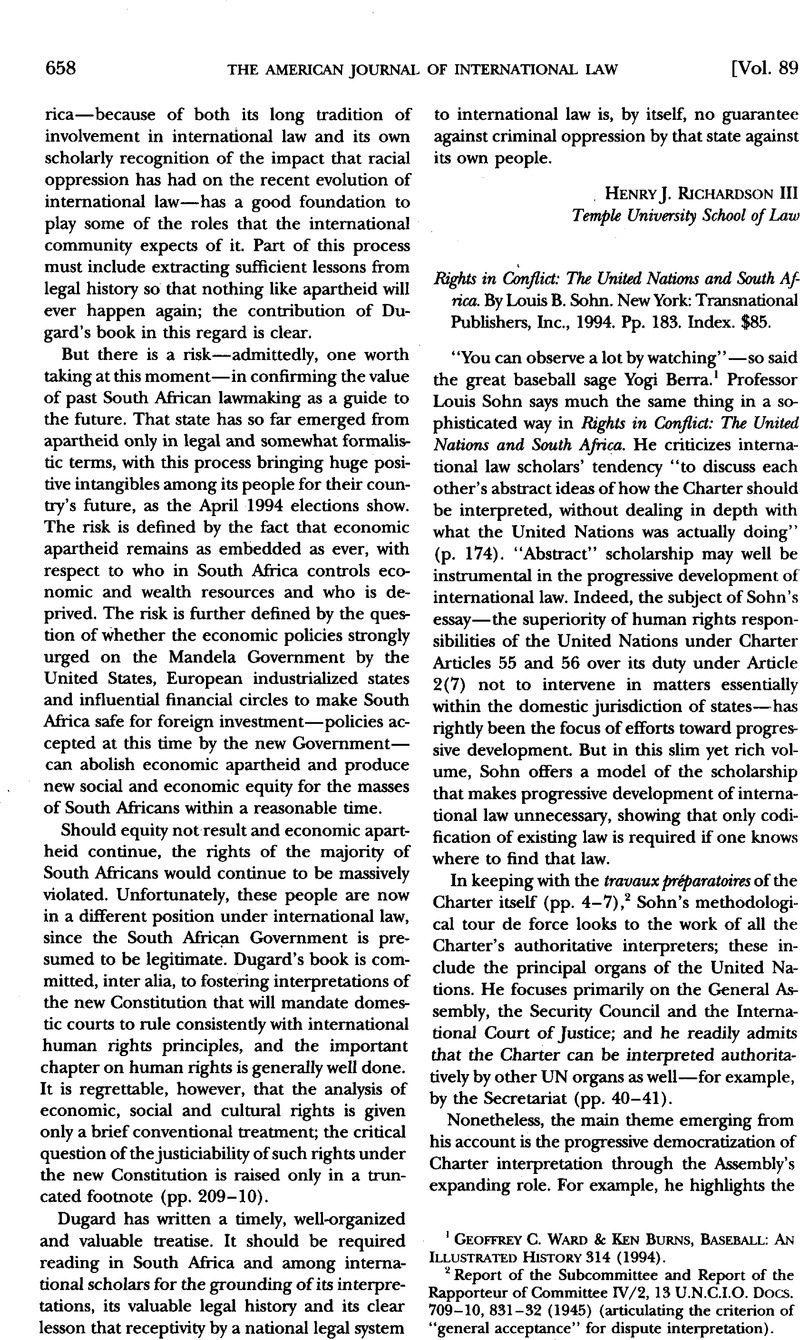No CrossRef data available.
Article contents
Rights in Conflict: The United Nations and South Africa. By Louis B. Sohn. New York: Transnational Publishers, Inc., 1994. Pp. 183. Index. $85.
Published online by Cambridge University Press: 27 February 2017
Abstract

- Type
- Book Reviews and Notes
- Information
- Copyright
- Copyright © American Society of International Law 1995
References
1 Geoffrey C. Ward & Ken Burns, Baseball: An Illustrated History 314 (1994).
2 Report of the Subcommittee and Report of the Rapporteur of Committee IV/2, 13 U.N.C.I.O. Docs. 709–10, 831–32 (1945) (articulating the criterion of “general acceptance” for dispute interpretation).
3 SC Res. 418, UN SCOR, 32d Sess., Res. & Dec. at 5, UN Doc. S/INF/33 (1977).
4 Legal Consequences for States of the Continued Presence of South Africa in Namibia (South West Africa) notwithstanding Security Council resolution 276 (1970), 1971 ICJ Rep. 16, 52–53, paras. 112–14 (June 21).
5 Quoting Nationality Decrees Issued in Tunis and Morocco, 1923 PCIJ (ser. B) No. 4.
6 The resolution made clear that “irreversible” change in South Africa was a condition for the international community’s lifting sanctions. It does not appear that the Bush administration felt the United States was legally bound by the GA declaration. In its “Justification for Conclusion that the South African Government Has Met the Conditions for Sanctions Lifting,” the administration did not list the declaration’s requirement for “irreversible change” among the conditions applicable under U.S. law for the lifting of U.S. sanctions. See The Termination of Economic Sanctions against South Africa: Joint Hearing Before the Subcomms. on International Economic Policy and Trade and Africa of the House Comm. on Foreign Affairs, 100th Cong., 1st Sess.,App. 3, at 150–54 (1991) [hereinafter Justification]. On the other hand, there is no doubt that the GA declaration had some normative impact, if only as a political commitment. For, in explaining the administration’s decision to lift sanctions, Assistant Secretary of State for African Affairs Herman Cohen testified that, indeed, “an irreversible process of dismanding apartheid [was] underway.” Id. at 21.
7 UN Charter Arts. 1 & 2.
8 See Justification, supra note 6, at 154.
9 See, e.g., George A. Bermann, Taking Subsidiarity Seriously: Federalism in the European Community and the United States, 94 Colum. L. Rev. 331 (1994).
10 See United Nations Legal Order 1–31 (Oscar Schachter & Christopher C. Joyner eds., 1994).


